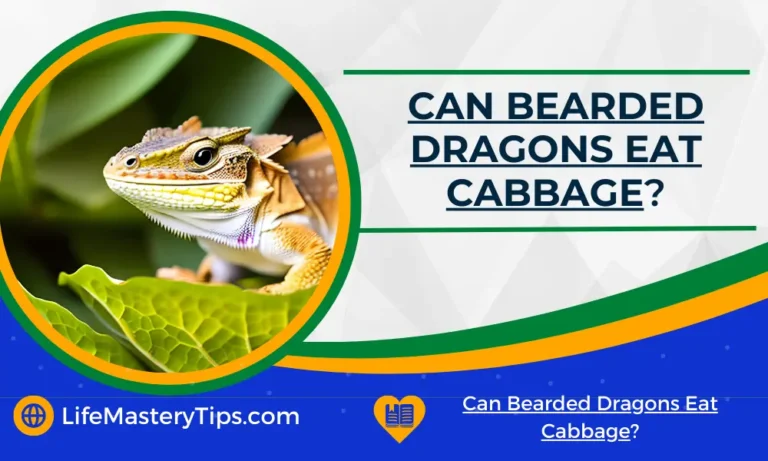Can bearded dragons eat cabbage? Looking for a veggie that’s bursting with vitamins, minerals, and antioxidants? Look no further than cabbage! But what about your bearded dragon—can they munch on this crunchy delight? Let’s discuss—red, green, Savoy, and Napa—and see which ones are safe for your scaly friend.
Cabbage, a veggie superstar in our kitchens, finds its way into soups, salads, and various dishes. But what about our scaly friends – can bearded dragons munch on cabbage without worry?
The simple answer: Yes, cabbage is generally safe for bearded dragons. But, as with many things in life, moderation is key. Consuming cabbage too frequently might throw a wrench into the delicate workings of their thyroid. So, let’s dive into the cabbage patch of knowledge with some guidelines.
If you’ve got kale in mind for your dragon, hang tight – this guide “Can Bearded Dragons Eat Kale?” has got your back.
Can Bearded Dragons Eat Cabbage?
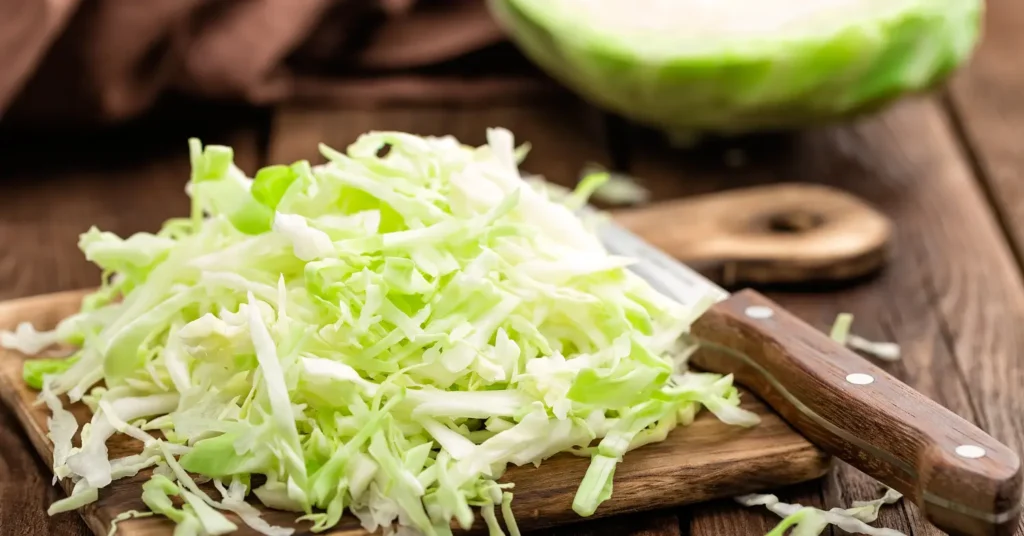
Bearded dragons can eat cabbage, but it should be given in moderation. Cabbage is a leafy green vegetable that can be a part of their diet, but it should not be the main component. Bearded dragons require a varied diet consisting mainly of insects, along with some vegetables and fruits.
Here are some important things you need to keep in mind:
As omnivores, bearded dragons need a balanced diet of plants and insects. Their diet should change as they grow, with juveniles needing more protein. Commercially available insects may lack essential nutrients and should be gut-loaded before feeding. Avoid wild-caught insects due to potential toxins.
Citation: Biology and Medicine OF Bearded Dragons By Mark A. Mitchell, DVM, MS, PhD.
No need to cook it up—serve all cabbages raw! Here’s the easy guide:
Cabbage is not just a veggie; it’s a dragon-approved feast!
Cabbage contains a compound called goitrogen, which can interfere with the thyroid function in large amounts. Therefore, it is important to offer cabbage sparingly and in small portions to avoid any potential health issues. It is recommended to feed cabbage to bearded dragons as an occasional treat rather than a staple food.
Read this guide “Can Bearded Dragons Eat Cucumbers?” to find out whether cucumbers are a suitable addition to your bearded dragon’s menu.
Can Bearded Dragons Munch on Red Cabbage?
Absolutely! Red cabbage is a nutritional powerhouse for your beardie. Packed with fiber, Vitamin C, Vitamin K, antioxidants, manganese, potassium, magnesium, Vitamin B6, and folate, it’s like a dragon superfood. Plus, it’s low in fat and sugar, making it a healthy choice. The calcium to phosphorus ratio is also spot-on, making red cabbage a fantastic addition to your dragon’s diet. Feel free to treat them to some red cabbage a few times a week.
How About Green Cabbage for Bearded Dragons?
Green cabbage is good too, but it’s a bit less nutrient-packed than its red counterpart. It has less fiber, calcium, iron, potassium, and Vitamin C, but still falls within the healthy range. However, watch out for goitrogens, which might mess with your dragon’s thyroid. Limit their green cabbage intake to once a week or less, especially if there are other goitrogenic foods in the menu.
Savoy Cabbage: Not the Best Choice
Sorry, Savoy cabbage isn’t the ideal pick for your bearded dragon. It’s a tad too acidic, has more phosphorus than calcium, and packs a punch of Vitamin A. Too much of it could lead to stomach issues and even metabolic bone disease. Give your dragon a small serving every other week to keep things safe.
Napa Cabbage: A Sweeter Option
Napa cabbage, or Chinese cabbage, is a sweet treat for your dragon. With a sweeter taste and thinner leaves, it’s rich in Vitamin C, Vitamin A, fiber, and calcium. The calcium to phosphorus ratio is just right, making it a safe choice. However, it’s goitrogenic, so offer it about once a week.
How Much Cabbage Should I Feed My Bearded Dragon?
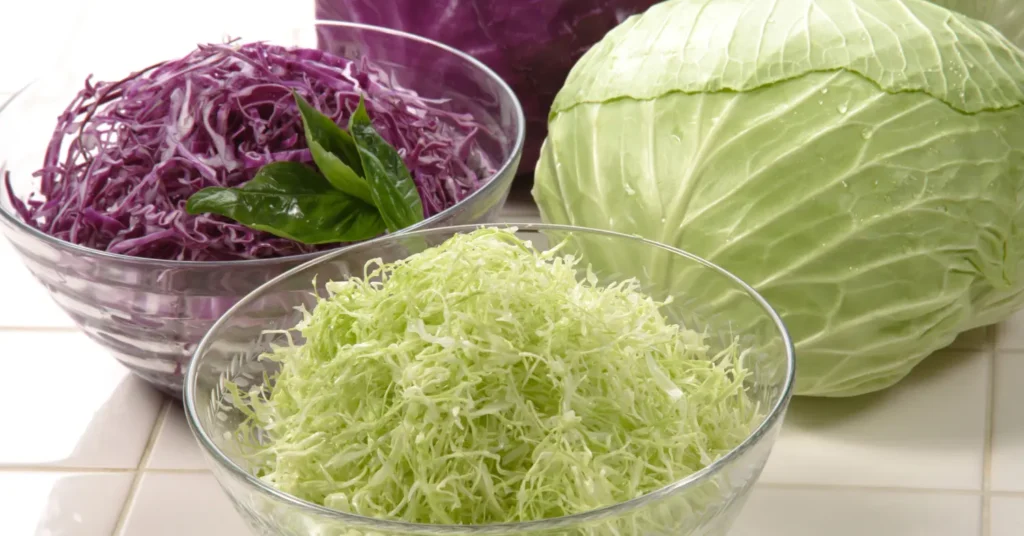
Due to the goitrogenic properties of cabbage, it’s recommended to feed it to your bearded dragon sparingly. It’s best to offer cabbage as an occasional treat rather than a staple food. A good guideline is to provide cabbage no more than once or twice a week, and in small portions.
It’s important to note that a bearded dragon’s diet should consist primarily of leafy greens, vegetables, and some fruits. These can include collard greens, mustard greens, dandelion greens, butternut squash, bell peppers, and berries, among others. The majority of the diet should be comprised of these foods, with occasional treats like cabbage.
Always make sure to wash the cabbage thoroughly before offering it to your bearded dragon, and consider chopping or shredding it into small, manageable pieces. Additionally, it’s crucial to provide a balanced diet that includes proper calcium and vitamin supplementation, as recommended by a reptile veterinarian or herpetologist.
What Makes Cabbage Good For a Bearded Dragon?
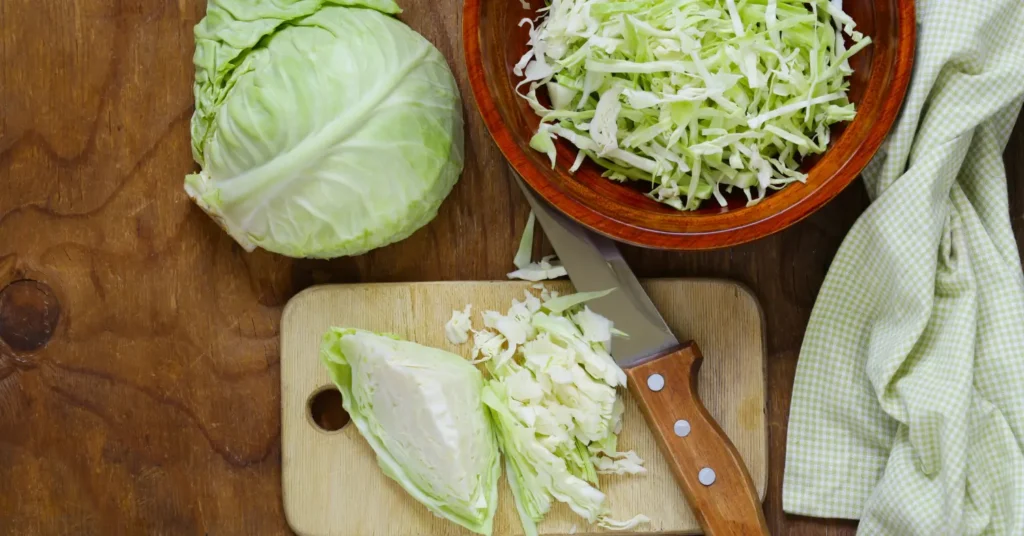
Cabbage is a good source of vitamins A and K, which can help your bearded dragon maintain their healthy skin and teeth. The vitamin A in cabbage is also essential for healthy eyesight, while the vitamin K helps keep their blood vessels healthy.
Cabbage has a high amount of fiber, which helps digestion by slowing down food digestion time so that it’s easier to absorb all those nutrients from the food you feed your bearded dragon. This means less waste being excreted throughout his body!
Finally, cabbage has very few calories compared with other types of vegetables (it’s about 20 calories per cup). This makes it an ideal choice if you want something crunchy as part of his diet but don’t want him eating too many bites at once–and since it’s low-fat too there will be no guilt involved when he does eat too much!
Cabbage | Nutritional Data
Cabbage is a great source of vitamins A, C and K. It also contains plenty of dietary fiber, which helps to lower cholesterol levels in the body. The Vitamin K content in cabbage may help regulate blood clotting and prevent heart disease by lowering blood pressure.
Here’s a table summarizing the nutritional data for cabbage per 100 grams:
| Nutrient | Amount |
|---|---|
| Calories | 25 kcal |
| Carbohydrates | 5 grams |
| Fiber | 2 grams |
| Vitamin C | 36.6 mg |
| Vitamin K | 76 mcg |
| Folate (Vitamin B9) | 43 mcg |
| Potassium | 170 mg |
| Calcium | 40 mg |
| Magnesium | 12 mg |
Please keep in mind that these values are approximate and can vary slightly depending on the specific variety of cabbage and the cooking method.
Here’s the lowdown, broken down per 100g serving:
The Mineral and Vitamin Bonus Round:
And a couple of extras:
Now, let’s not forget the nutrition scores: an exceptional Ca:P ratio of 1.5:1, earning it a healthy label. It’s safe to serve 2-3 times a week.
Cabbage is one of the few vegetables that contain calcium, magnesium and iron—all nutrients important for bone health and muscle development in young children or those recovering from illness (like an infection).
Best Type Of Cabbage For My Bearded Dragon?
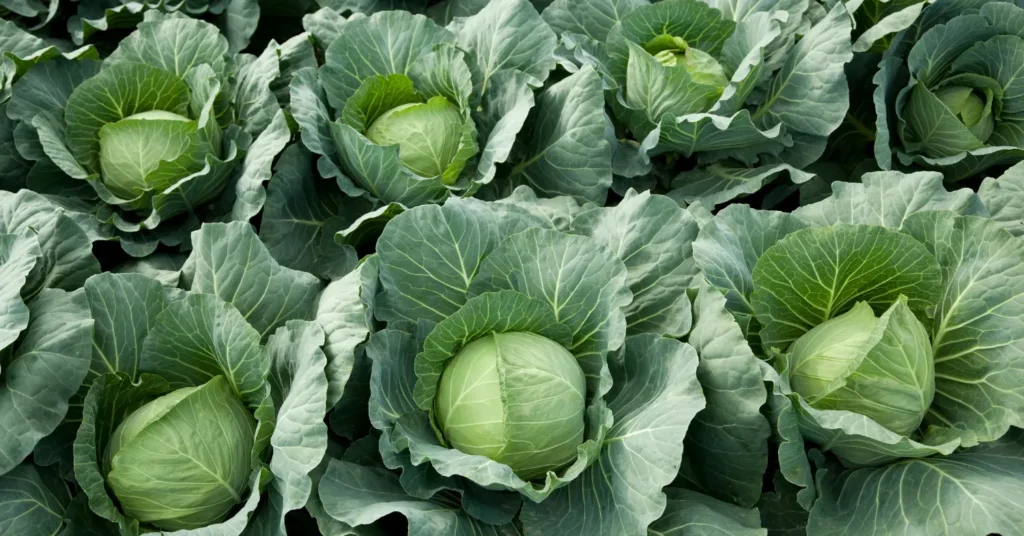
The best type of cabbage for your bearded dragon to eat is red cabbage. You can also give him a savoy or napa, but they are not as high in vitamin A as red cabbages. Green cabbages may be poisonous to your bearded dragon because they contain more oxalic acid than green leaves that are not grown in soils rich with iron and calcium (such as spinach).
Preparing Cabbage For Your Bearded Dragon
To prepare the cabbage, remove the core and wash thoroughly. Then cut into small pieces, so that they’re easy for your bearded dragon to eat. If you’re feeding cooked cabbage as a treat, make sure it’s cool before serving so that your pet doesn’t get sick from eating too much at once.
Common Cabbage Varieties For Bearded Dragons:
Cabbage is a great source of vitamin A and C, as well as calcium and phosphorus. Cabbage is also a good source of vitamin K, vitamin B6 (pyridoxine), folate and fiber.
Cabbage contains high levels of lutein which protects against macular degeneration in humans. It also contains anthocyanins which may help prevent cancer!
Healthy Calcium To Phosphorus Ratio
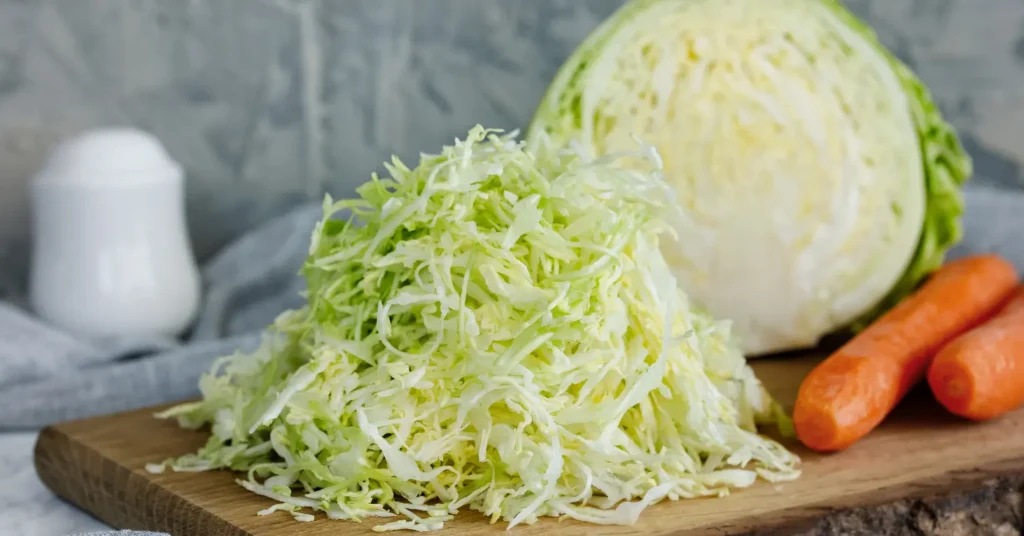
The calcium to phosphorus ratio is the amount of calcium in your bearded dragon’s diet compared to its phosphorus. Calcium is found in many different foods, so it’s important for you to pay attention and not overfeed your lizard by giving him/her too much of one nutrient or another.
The ideal ratio for reptiles is at least 0.5–1% calcium by weight (wet weight) per day based on their age, size and activity level; however this depends on where they live as well as how much sun they get during their day-to-day lives outside of captivity—older lizards may need less while younger ones tend toward higher levels due directly related with growth spurts.*
If you feed an adult male Bearded Dragon 2 large handfuls every day then he should have enough calcium but not too much phosphorus which could lead him into serious health problems such as kidney failure or even death due lack thereof being able trust provide adequate nutrition intake daily without having any side effects from consuming too much salt!
Low Fat Content
Cabbage is a low-calorie, low-fat, low cholesterol and sodium food. It also has a low saturated fat content and no trans fats.
Cabbage has a glycemic index of 19 on average—which means that it will lower your blood sugar levels after eating it—and it’s packed with vitamins A and C as well as calcium (1 cup contains more than 100 percent of the RDA).
High Calcium: Phosphorus Ratio
The calcium to phosphate ratio is important for bone health, and it can be calculated by dividing the calcium content of your food by its phosphorus content. The ideal amount of calcium is 1:1; however, if you’re feeding a bearded dragon reptile a high-quality diet with lots of quality protein and vitamin A (such as cricket chow), then you may want to increase this ratio slightly (to 2:1).
Mineral content
Cabbage is a good source of calcium, phosphorus and potassium. It also contains magnesium, iron and zinc. Copper, manganese, selenium and sodium can be found in cabbage as well. Manganese helps your dragon to grow strong bones (by making them harder), while sodium is important for keeping his or her blood pressure in check
Rich Vitamin Composition
The rich vitamin composition of this cabbage has been shown to be beneficial for bearded dragons. Vitamin A helps strengthen the immune system, while vitamins C and K help maintain healthy skin and eyes. Thiamine (B1) is another important nutrient that supports the nervous system and helps prevent heart disease.
Riboflavin (B2), niacinamide (B3), pantothenic acid (B5), folate/folic acid, calcium oxalate/calcium phosphate salts are all found in cabbage leaves as well as other vegetables such as kale or broccoli. Iron can be found in red meats but also exists naturally in some foods including leafy greens like spinach or collard greens which contain vitamin C.
Are There Any Concerns When Feeding My Bearded Dragons Cabbage?
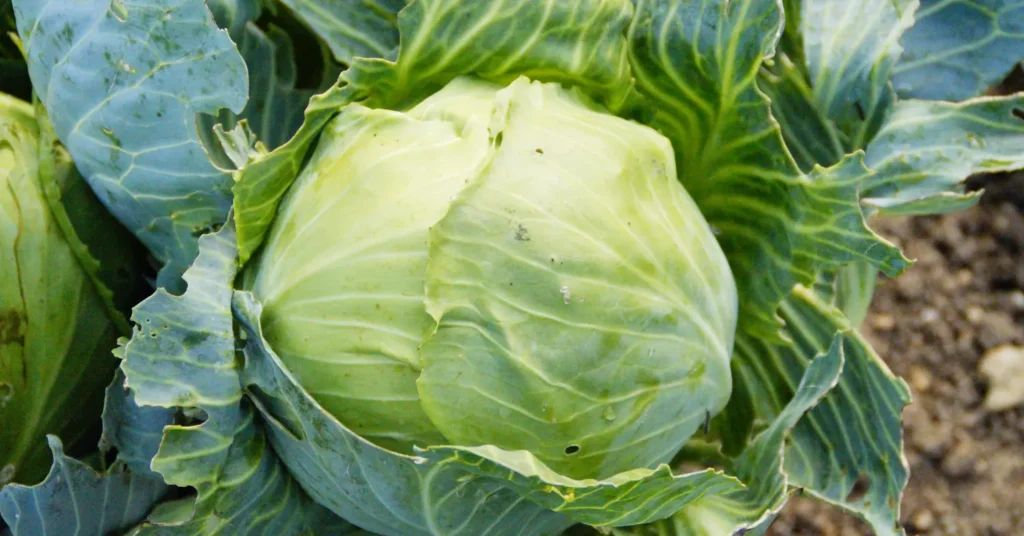
There are no concerns when feeding your bearded dragon cabbage. Cabbage is a good source of vitamins and minerals that can help keep your pet healthy and fit. It also contains many different antioxidants, which may reduce the risk of some diseases in humans.
The calcium in cabbages helps build strong bones while the vitamin A helps keep their eyes healthy. The vitamin K in cabbage helps regulate blood clotting and may help prevent heart disease. Cabbage is also a good source of fiber, which can help prevent constipation.
Wash & Remove Stalks:
It is high in calcium, low in fat and vitamin C. This is great for your bearded dragon as it will help them grow stronger and healthier. Savoy cabbage can also be fed as a treat to your pet reptile, but make sure you remove the leaves from the stem so that they don’t choke on them! Savoy cabbages are also full of fiber which helps keep digestion healthy; this means you won’t have any stomach problems when feeding these vegetables to your pet reptile!
How Often To Feed Bearded Dragons Cabbage?
It’s important to feed cabbage once a week. The amount you feed your bearded dragon should be small, as this is the only way for your pet to get enough nutrients. Feeding cabbage as a treat is also an effective way of keeping them happy and healthy!
Can Bearded Dragon Eat Cabbage Core?
Cabbage core is a great food for bearded dragons. It’s not just for the kids, either—it can be fed to adults too!
If you want to give your bearded dragon some cabbage core, follow these steps:
Prepare the cabbage core by removing any leaves or rinds that are still attached to it (this will make it easier for them to digest). You should also wash and dry the vegetable thoroughly before serving it as a meal.
Feeding times depend on how much time you have available during their day-to-day routine but generally speaking they should be fed every 2-3 days depending on how much they eat over those days/weeks/months etc.
The general rule of thumb is if they don’t finish what’s been put out then try again tomorrow – this helps ensure there aren’t leftovers rotting away somewhere nearby which could potentially cause health issues later down the road.”
Can Bearded Dragon Eat Cooked Cabbage?
Cabbage is a good food for bearded dragons, and can be fed raw, or cooked. It can also be part of their diet as a snack. Cabbage is high in vitamin C, so it’s great for your dragon’s health.
If you want to feed your beardie cabbage, just make sure that the leaves are not too soft! Make sure that they’re crunchy enough before giving them to your pet lizard.
Bonus Read | Can Bearded Dragons Eat Cabbage
If you’re looking to get your bearded dragon acquainted with cabbage, this article is for you! We discussed the benefits of feeding your lizard this popular food item and how it can benefit not only themselves but also those around them.
When your bearded dragon munches on red cabbage, it’s like giving them a superhero boost! Why? Because red cabbage is packed with antioxidants, the shield against inflammation and cell rusting. It’s like a bodyguard against free radicals, keeping your beardie’s health in top-notch shape.
Feeding cabbage to your bearded dragon is a breeze. Here’s the drill:
And there you have it – cabbage, a crunchy and colorful addition to your dragon’s dining repertoire. Keep it varied, keep it moderated, and keep those cabbage parties rolling!
You Might Also Like:
